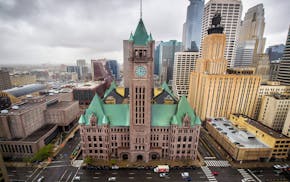"The big guys always win." That's the lesson Julian Empson Loscalzo says he learned about stadium politics 33 years ago.
In 1979, Loscalzo was a kid in a scruffy "Save the Met" T-shirt. I was a kid with a reporter's notebook. He protested and I scribbled as the Legislature authorized a $55 million bond issue for construction of the Metrodome. That figure sounds cheap because, even then, it was.
In 2012, Loscalzo operates Ballpark Tours ("purveyors of outdoor baseball since 1982") and lobbies for clients including the St. Paul Saints, who this year are seekers of state bonding help for a new downtown ballpark. We perched under the stony stare of Gov. John A. Johnson's statute last week to compare the push for a new home for the Minnesota Vikings to the stadium fight of our misspent youth.
The "big guys" from business and labor were back in action last week, finally as visible as they were in 1979. "They've got the time, the resources, the staying power" and the political clout to work their will, Loscalzo said.
Still, "it's less clear to me that it's inevitable this time. There are so many more moving parts to this. This one makes 1979 look simple." He counted the ways:
•The teams -- the Twins in 2006, the Vikings this year -- are more plainly in the driver's seat than they were in 1979.
"It used to be that the Legislature set the parameters for a deal," he said. The Metrodome was built on the cheap because the 1979 Legislature was locked in at $55 million and no more.
As Arden Hills site boosters would point out, the Vikings have compromised at the behest of various Minnesota elected officials. But most legislators were left out of their decisionmaking loop. The scope of the $1 billion project has never seemed open for discussion. Resentment about that situation may explain why some legislators were still popping up last week with diversionary schemes about what to build, where to build and how to pay for it all.
• Related to point No. 1: The professional-sports business model now demands facilities that generate megarevenue. Pro leagues won't long accommodate a team that lacks such a venue. That was the carefully couched but unmistakable message that NFL officials brought to St. Paul 10 days ago.
Heck, that was already the message in 1979 when Loscalzo's baseball-loving band was informed that refurbishing the old Met for the Twins and Vikings wouldn't do. "We realized when we lost that fight that professional sports had moved from a game to a business," he said.
• The "no new taxes" rigidity of most members of the Republican majority eliminates the financing option that made the Metrodome bill work -- a liquor tax in Minneapolis.
The same political allergy is combining with the team's resistance to keep other obvious funding options out of contention. Taxes on tickets, memorabilia, parking, seat licensure and pretty much anything else taxable at a stadium are ideas still mentioned occasionally -- including by a handful of Republicans who evidently hate gambling more than taxes. But those ideas haven't gained traction.
• Gambling has. But it brings another layer of complications, including moral ones. Gambling preys on the mathematically challenged and financially desperate. Its expansion stands to enrich some private interests as well as public ones, while disrupting already fraught relationships between the state and its indigenous people. It's considered a moral hazard in poor neighborhoods and blight in tony ones.
"Gambling wasn't even around in 1979. We didn't have gambling in Minnesota until the 1980s," Loscalzo noted.
• The heightened transparency of the social-network age also works against a stadium bill's success. (This point comes courtesy of another "Save the Met" alum, Tom Bartsch.) In 1979, powerful interests could flex their muscles in ways unobserved by those of us in the Capitol basement, let alone by people with smartphones and tablet computers. More visibility constricts legislators' freedom of movement -- or so they think.
In 1979, Loscalzo argued for what he believed was good for his beloved baseball. With maturity has come a broader concern about what's good for Minnesota.
"I'm not opposed to the use of public dollars for these things. There are amenities that are important to be supported by government because they bring other things to the table," he said. "The dilemma is in finding a balance, finding the good deal for the public."
Loscalzo is hoping that a balance will be found that includes a new venue for the still-simple summer game played by the St. Paul Saints. I'm hoping that a balance will be found that shows that the Legislature in 2012 is still capable of doing something big.
-------
Lori Sturdevant is a Star Tribune editorial writer and columnist.

As a topic among policymakers, housing is hotter than it once was
Worries about the U faded in search for new president

Up next for the DFL: amending the state Constitution
To combat contempt of courts, there's no substitute for character

